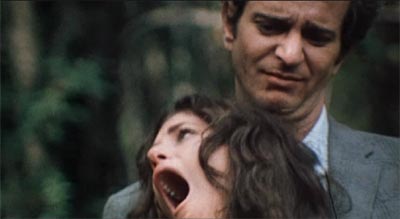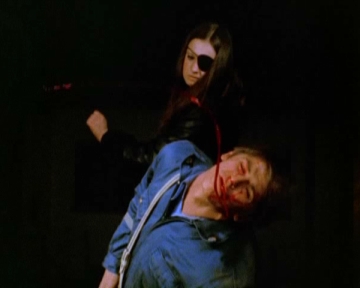A Trifecta of Rape and Revenge: I Spit on Your Grave/Last House on the Left/Thriller: A Cruel Picture

I Spit on Your Grave
My first viewing of I Spit on Your Grave was in high school. I felt it was a terrible movie that followed no logic and the endless rape scenes were effective only in that they didn’t shy away from brutality. However, the movie was very poorly made and written, and I thought it was ridiculous that during the bathroom scene, the director would have us believe that there was a lock on the outside of the door, allowing people to be locked in (?).
Since a man I respect, Joe Bob Briggs, was instrumental in getting a remastered disc out, and he would be providing a commentary, I thought I should give it another try. I wanted to hear how Joe Bob’s would supposedly justify this heinous film. Joe Bob Briggs is an intelligent man with a terrific sense of humor, and perhaps I missed something as a 16 year old that he picked up. He spends most of the time defending the film against the accusations made by Siskel and Ebert and many feminists who say that the film is offensive because it seems to imply that women deserve to raped, and that it endorses the excessive sexual torture that the lead character goes through. He makes many good points; the movie does indeed seem more objective than a rape fantasy would need to be. There is no way to identify with the male characters, as they are idiotic and savage without remorse, and seemingly treat the raping as a game. However, Joe Bob cannot get around how inept most of the movie is whenever the raping is not being presented. The camera lingers on scenes of nature far past making their point and moving into the territory of writer/director Meir Zarchi simply wanting to use every bit of film he had, to justify the expense of exposing it. It is also difficult to escape the logic that Camille Keaton’s character continuously puts herself in further harm when she has control during the revenge sequences. Think of when she is pointing a gun at one of her assailants from her car and allows him, without force, to take the gun away from her. That she would want to let Matthew, the “retarded” guy, enter her sexually at all, is more than a little difficult to believe. And the final two kills are doled in a very lazy and confused fashion. The two men that die in the water could be diagnosed by a coroner as “unidentifiable causes.” While the second man is chewed by a propeller, the first seems to die of being repeatedly circled in the water by a boat. Not that he drowns; just that he begins bleeding for apparently no reason. It suggests that after the hanging and bathtub set pieces, Zarchi simply lost interest, but knew he had to dispatch of the characters somehow. It is also troubling that despite having been explicitly brutalized for 25 minutes of screen time, followed by a healing process, Zarchi felt the need to show Keaton fully nude several times during her revenge sequences. It defeats his argument that this is a feminist movie, but obviously just base exploitation. If the scenes are about her regaining her power, and he wanted to show how she was using sex as a weapon, during the Matthew hanging sequence, she would have been on top, rather than the other way around.
That Zarchi is a canny salesman, there is no doubt, but he is not a good filmmaker, nor does he provide anything intellectually stimulating. The movie has to be justified, as in, it deserves not to be excoriated by the press and public, as a feminist film, because the traditional response would reveal how crass and empty the film is.
There are glimpses here and there that reveal what Zarchi may have been getting at in a more honest portrayal. As Keaton crawls away on her hands and knees after the first rape, it feels more grimy and accurate, and a fair presentation of the searing pain and desperation that this character would be feeling.
Unfortunately, Zarchi’s lack of talent comes through in all other areas of the film, from the supposedly big scare where the phone is kicked away from Keaton as she tries to call the police (if you look not so carefully, the entire thing is telegraphed by the shadow of the guy waiting to do it which is evident from the first part of the shot, as if he’s simply waiting for his cue from the director), to the awful writing that she produces that is supposed to be evidence of her abilities as a writer who is a scribe for “women’s magazines,” to the terrible overacting he lets the actor playing Matthew get away with, etc.
On his own commentary, Zarchi tells the story that supposedly inspired the film, about a woman whom he, his daughter, and a friend discovered after she’d been raped and beaten. Despite the obvious fact that he is clearly reading from prepared material (his stiff presentation gives it away), the story is absolutely terrifying, and has the true horror that would make a great movie. Zarchi managed to get not one bit of this story into his movie, despite the vivid descriptions he gives during the commentary. He clearly experienced something profound and disturbing but didn’t have the skills necessary to get it on film.

Last House on the Left
Loathing it the first time, I figured, like with I Spit On Your Grave, I should give Last House another try. I always felt that Craven’s film was far more offensive because I saw it as him endorsing the fact that these girls deserved to be raped and killed because they were looking for drugs. Why distinguish between Craven and Zarchi, when they both made reprehensible films? Because Craven is a smart man who knew what he was doing, and Zarchi is a moron, who got lucky that someone was offended at his terrible movie. It is more damaging that Craven sent the message on purpose, rather than Zarchi just being foolish and not knowing how people might take his incompetence.
Seeing LHOTL again (for the first time since I was 18), I no longer feel that the movie is endorsing the raping and murdering. There is in fact one sequence I really liked, that being of the rape on the ground where David Hess has his bloody face and spit covered mouth pressed against the actress playing Mari, and the aftermath as the gang is suddenly quiet, and she walks off to the water to “cleanse” herself. But the rest of the movie is completely incompetent, especially with one of the clumsiest fights (in terms of staging) in the history of filmmaking, that being the chainsaw battle in the conclusion.
The film also wins two other awards, and that is worst musical score, and most contrived, slightly beating out Die Hard With A Vengence. The score is amazing in its inappropriateness, especially with the country number (performed by the actor in the film playing Krug, David Hess) that gets played over the closing credits and also in the car as Krug and his lady have sex in the back seat, while the two girls are tied up in the trunk. The song’s lyrics are basically the story of the film up to that point, about the violence of the escaped gang, all sung in a good ole’ boy fashion, as if it was an episode of The Dukes of Hazard. The music gets even worse with the totally mishandled Keystone Kops sequences, which Craven describes on the commentary as a necessary cutaway, although I am not sure he is aware of how much it takes out of his already poorly made movie, especially the scene where the cops attempt to ride on top of a truck with no room in the back as it’s filled with chickens. It cuts down on the intensity of the violent scenes and makes them seem like a joke as well, as if they weren’t in enough poor taste. If he needed these scenes (complete with pissed off Sheriff cartoonishly slamming his hat on the ground in disgust) to pad out the running time to an acceptable theatrical length, surely he could have found something that tied into the story itself. Hell, even a Bugs Bunny short would have worked better.
In terms of contrivance, I’m not sure there is a bigger leap of faith than the one LHOTL asks you to take. The first girl, Mari, is shown as living somewhere in the country (upstate NY we are supposed to assume, but in the movie they call it Riverdale, which is really the rich white Bronx), in the middle of nowhere. When she goes to the dangerous city with her friend, and they are accosted by this gang, raped and beaten and thrown in the back of a car, the gang tries to escape authorities by driving towards Canada (Riverdale is not the correct way to get to Canada from Manhattan, but that’s being picky). And their car happens to stop functioning right in front of Mari’s house. After they rape and kill the two girls, then they decide to stop in to Mari’s parent’s house. It gets worse. The cops, who figure out that the car parked in front of Mari’s parent’s house is the gang’s, run out of gas on the way to their house.
While I no longer believe that Craven’s film is endorsing the raping and brutal murders, I did find it interesting that on the commentary and during the featurettes, none of the actors or filmmakers could seem to remember the character of Mari’s name. They would stumble and then just use the name of the actress playing her. That says to me that it was not a concern to know these people at all, rather, just use them as a pawn in audience abuse by subjecting these anonymous characters to savage treatment.

Thriller: A Cruel Picture
Someone ought to explain why they think this movie is a) competent b) interesting c) inventive d) entertaining e) not just fanboy bullshit praise based on the fact that Elle Driver (Daryl Hannah’s character in Kill Bill) wore eyepatches too. It’s one of those things where if you pay attention to the details, you will laugh at it, because they don’t make any sense at all. Normally, in low grade exploitation such as this, you shouldn’t care about the small stuff, but the movie moves so slowly and nothing is really happening, so we have no choice.
Spoilers:
I can overlook the fact that she’s not cooperative at first and doesn’t speak and yet, somehow, he’s able to elicit her address from her to write her parents the series of letters (let alone that she wasn’t awake most of that time). I don’t really care that the doctor arrives to inject her with heroin less than 2 minutes after the pimp called her, suggesting that he lives next door. I don’t focus on the fact that even though she scratches up her first customer pretty badly, the pimp still has no problem filling up her schedule, and even hands her a to-fuck list every day, as if it made any difference and wasn’t completely at the client’s whim. I have more trouble with her having a day off where she can roam around, despite being forced into her situation, and repeatedly trying to escape. Is that normally how someone is enslaved? And is heroin not available in the city?
Unless I didn’t pick up on some small detail, it appeared that she went to all that trouble with that guy she paid off (who then asked for “2 more bills”) in the city, whom she met secretly, despite not being able to speak, just so she could get keys to the gun shed where she had trained? Are those the only guns that are possible to get in all of Sweden? It wasn’t for the car, since he said she had given him enough where he would throw that in.
Spoilers over:
I know I’m picking at seemingly small things (unlike say, that the final kill has no real payoff and that even though her driving instructor says there’s nothing more he can teach her, she appears not to be able to master the “swerve” technique he taught her when she’s chasing someone and a large truck gets in her way, let alone drive very competently at all), but there was so little going on otherwise.
I have to say that they picked the wrong actress for what was intended as a physical role. I’ve never seen someone so unexcited and awkwardly learning karate, how to fire a gun, and how to drive a car. There’s the scene where her instructor is showing her moves, and she gets on top of him and weakly chops at him with an amazing lack of interest and energy, though this is supposed to show us how good she’s getting at it.
These things probably necessitated the repeated slow motion shots during the revenge sequences, since at regular speed, she would look silly, especially when fighting the two cops (though why she waits around in mourning for long enough for the cops to arrive is a bit of a mystery, it’s not like these are the first people she killed, so it’s not about the shock of going through murder thing). The blood spitting was nice though, even if the sound effects were more than ridiculous. Though I might have enjoyed these sections more because they reminded me of the famous shot in Behind the Green Door in ultra slow motion, which removes the pornographic nature of the movie and the penis takes on another meaning (if I may be so pretentious and suggest a comment on the dominance of the patriarchy, especially as it flaps over Marilyn Chambers’ head, her eyes closed, but willingly accepting whatever she is hit with), as the blood sprays do here.
I would also say that Christina Lindberg’s lack of athleticism probably led to the prolonged scenes where we watch her load gun after gun, one bullet at a time, since we have to build up interest in the upcoming revenge sequences some way. There is no immediacy in Lindberg’s performance, no real urgency of anger, nor planning, in comparison to something like what we see in Zoe Tamerlis in Ms. 45 (who looks awfully like Lindberg as well), so her revenge feels like something she does on her day off, still going back to being a junkie whore when she’s not shootin’, not a necessity.
If the movie were made with any sort of skill, none of this would be much of a problem. But the porn look of the sets (the bare walls while a character sits behind a big empty desk are like anti-production design), porn level of the acting, the camera indifferently placed, the generic sound effects (as if they were off a sound effects CD that featured police car sirens, car chase noises, etc.) don’t often sync up with the action, defeat any notion of this being spare/no frills art. And whenever writer/director Bo Arne Vibenius can’t think of a way to get out of a scene (like the shootout where Madeline kills everyone in the room but Tony, yet we know she can reload and he’s in the middle of running, though it’s not clear where), he simply cuts to later on, creating a rather jarring feeling.
Since I haven’t seen the 82 minute version (vs. this 106 minute version), I can’t comment on what was or wasn’t added, but I can say that the hardcore inserts, much like the ones in Female Vampire, serve no purpose, and the long, repetitive set-up which pushes past the 1 hour mark certainly could have been cut down. This is the same with the training sequences. The less of her embarrassing karate chops, the better (love that scene where she’s carefully practicing them in secret, can’t let on to your rather laid back pimp that you’re learning how to be tough on the side).



